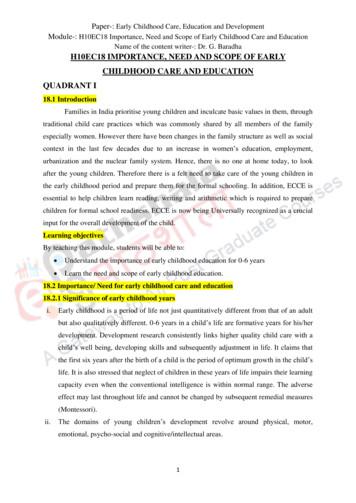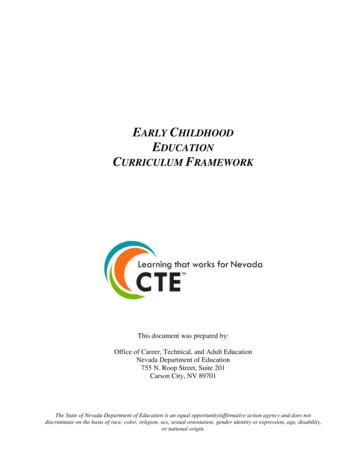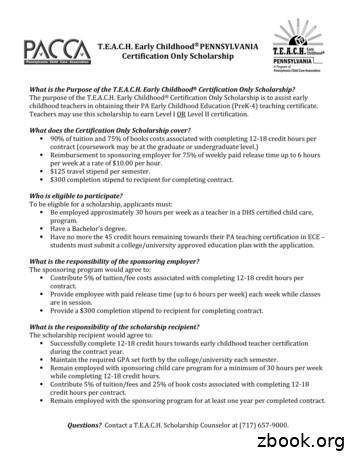EARLY CHILDHOOD EDUCATION - American River College
EARLY CHILDHOOD EDUCATIONArea:Dean:Phone:Counseling:Health & EducationDr. Steven Boyd(916) 484-8432(916) 484-8572http://www.arc.losrios.edu/Programs of Study/Health and Education/Early Childhood.htmA.A. - Early Childhood EducationA.S. for Transfer - Early Childhood EducationAssociate TeacherCertificates:Culture and Diversity SpecialistInfant SpecialistManagement SpecialistMaster TeacherSchool AgeSite SupervisorTeacherDepartment Certificates:Assistant TeacherFamily Child CareThe ARC Early Childhood Education Program The course work in the ARC Early Childhood Educationdepartment is approved by the California Commission onTeacher Credentialing as meeting the requirements forthe California Child Development Educational Permits.Students who complete selected certificates in the ECEprogram, along with required experience, are recommendedby the American River College faculty to the Commissionon Teacher Credentialing for direct issuance of ChildDevelopment Permits. All students enrolled in coursework that requires lab work atour campus Child Development Center or at an off-campusfacility, must show proof of TB Clearance (done withinthe previous 6 months), and documentation of all requiredimmunizations.DEGREES AND CERTIFICATESEarly Childhood Education DegreeThis program provides a foundation for in-depth earlychildhood teacher preparation both through stronggeneral education and through introductory studies inchild development and in early childhood curriculum andpedagogy. Topics include an introduction to the profession,observation techniques, age-appropriate curriculum,the child in the context of family and culture, and healthand safety practices for early childhood educators.Student Learning OutcomesUpon completion of this program, the student will be able to: synthesize child development research with principles andpractices for early childhood teaching to create early learningenvironments that are respectful, supportive, and challengingfor all children, from infancy through adolescence.design inclusive, culturally and linguistically appropriatelearning environments, based on child development,child observations, family information, and knowledge ofculturally diverse child rearing practices.incorporate strategies for building respectful, reciprocalfamily and community relationships in order to supportfamilies with their children’s development and learning.assess children’s learning through observation,documentation, and interpretation, using results to guidecurriculum and teaching strategies.Degree: recommend developmentally appropriate and culturallyrelevant approaches to teaching and learning that includerespectful, supportive relationships with children andfamilies, and curriculum that supports foundational skillsand concepts in language, math, science, art, and socialrelationships.demonstrate practices that maintain standards of health,nutrition, and safety in early childhood settings.apply ethical standards of behavior accepted by theprofession of early childhood education.Career OpportunitiesUpon completion of this degree, students possess thecompetencies required to work as a teacher in both privateand public early care and education settings, serving infantsthrough preschool-age children. Additionally, the individualcan work as a teacher in before-and-after school programs,serving school-age children.Requirements for Degree38 UnitsECE 300 Introduction to Principles and Practices inEarly Childhood Education.3ECE 312 Child Development (3).3or PSYC 372 Child Development (3)ECE 314 The Child, the Family and the Community.3ECE 320 Curriculum and Interactions inEarly Childhood Education.4ECE 321 Advanced Practicum in Early Childhood Education.4ECE 325 Positive Guidance Strategies with Young Children.3ECE 326 Making Learning Visible Through Observationand Documentation.3ECE 331 Care and Education of Infants and Toddlers.3ECE 404 Children with Special Needs.3ECE 415 Children’s Health, Safety and Nutrition (3).3or NUTRI 320 Children’s Health, Safety and Nutrition (3)ECE 430 Culture and Diversity in Early Childhood Education.3A minimum of 3 units from the following:.3ECE 305 Introduction to Family Child Care (1)ECE 316 Mass Media and Young Children (1)ECE 330 Infant and Toddler Development (3)ECE 342 Constructive Math and Science in EarlyChildhood Education (3)ECE 343 Language and Literacy Development inEarly Childhood (3)ECE 350 Introduction to Elementary Teaching withField Experience (3)or ENGED 324 Introduction to Elementary Teaching withField Experience (3)(continued on next page)American River College Catalog 2016-2017206
Student Learning OutcomesUpon completion of this program, the student will be able to:ECE 356Programs for the School-Age Child (3)ECE 358 Activities for the School-Age Child (3)ECE 361 Introducing Young Children to Visual Arts (3)ECE 363 Music and Movement with Young Children (3)ECE 407 Curriculum and Strategies for Children withSpecial Needs (4)ECE 414 CPR and Pediatric First Aid (1.5)or HEED 311 CPR and Pediatric First Aid (1.5)ECE 420 Administration I: Programs in Early ChildhoodEducation (3)ECE 422 Administration II: Personnel and Leadership inEarly Childhood Education (3)ECE 424Adult Supervision: Mentoring in a CollaborativeLearning Setting (2)ECE 432Leadership in Diversity (3)ECE 455Environment Rating Scales in Early ChildhoodPrograms (1) Associate Degree Requirements: The Early Childhood EducationAssociate in Arts (A.A.) Degree may be obtained by completion of therequired program, plus general education requirements, plus sufficientelectives to meet a 60-unit total. See ARC graduation requirements. Early Childhood Education A.S.for Transfer Degree The Associate in Science degree in Early ChildhoodEducation (ECE) for Transfer provides a clearly articulatedcurricular track for students who wish to transfer to aCSU campus, while also serving the diverse needs ofstudents interested in the breadth and depth of the field ofearly childhood education. Additionally, this degree exposesstudents to the core principles and practices of the fieldin order to build a foundation for their future personal,academic, or vocational paths.synthesize child development research with principles andpractices for early childhood teaching to create early learningenvironments that are respectful, supportive, and challengingfor all children, from infancy through adolescence.design inclusive, culturally and linguistically appropriatelearning environments, based on child development,child observations, family information and knowledge ofculturally diverse child rearing practices.incorporate strategies for building respectful, reciprocalfamily and community relationships in order to supportfamilies with their children’s development and learning.assess children’s learning through observation,documentation, and interpretation, using results to guidecurriculum and teaching strategies.recommend developmentally appropriate and culturallyrelevant approaches to teaching and learning that includerespectful, supportive relationships with children andfamilies, and curriculum that support foundational skillsand concepts in language, math, science, art,and social relationships.demonstrate practices that maintain standards of health,nutrition, and safety in group care early childhood settings.apply ethical standards of behavior accepted by theprofession of early childhood education.Requirements for Degree26 UnitsECE 300 Introduction to Principles and Practices inEarly Childhood Education.3ECE 312 Child Development (3).3or PSYC 372 Child Development (3)ECE 314 The Child, the Family and the Community.3ECE 320 Curriculum and Interactions inEarly Childhood Education.4ECE 321 Advanced Practicum in Early Childhood Education.4ECE 326 Making Learning Visible ThroughObservation and Documentation.3ECE 415 Children’s Health, Safety and Nutrition (3).3or NUTRI 320 Children’s Health, Safety and Nutrition (3)ECE 430 Culture and Diversity in Early Childhood Education.3The degree is designed to facilitate students’ successfultransfer to certain California State University (CSU)campuses that prepare them for advanced study in a varietyof graduate programs, as well as a variety of careers such asteaching, Child Development Specialist, Program Directors,and Child Life Specialists. With a BA in ECE/ChildDevelopment, students are eligible for the Master Teacherand Site Supervisor levels of the CA Child DevelopmentPermit, using the Alternative Qualifications category.Associate in Science for Transfer Degree Requirements: The AssociateThe Associate in Science degree in ECE for Transferprovides students with a major that fulfills the generalrequirements of the California State University for transfer.Students with this degree will receive priority admission withjunior status to certain California State University campuses.in Science in Early Childhood Education for Transfer for Transfer (AS-T)degree may be obtained by completion of 60 transferable, semester unitswith a minimum 2.0 GPA, including (a) the major or area of emphasisdescribed in the Required Program, and (b) either the IntersegmentalGeneral Education Transfer Curriculum (IGETC) or the California StateUniversity General Education-Breadth Requirements.The Associate in Science degree in ECE for Transfer(A.S.-T.) may be obtained by the completion of 60transferable, semester units with a minimum 2.0 GPA,including (a) the major or area of emphasis described in theRequired Program outlined below (earning a C or betterin these courses) and (b) either the Intersegmental GeneralEducation Transfer Curriculum (IGETC) or the CaliforniaState University General Education Breadth Requirements.The ECE courses required in this program are part ofthe CA Curriculum Alignment Project, Lower Division 8coursework.207American River College Catalog 2016-2017EARLY CHILDHOOD EDUCATION(Early Childhood Education Degree continued)
EARLY CHILDHOOD EDUCATIONCertificates Leading toChild Development PermitsTeacher CertificateARC also offers a sequence of certificates that guide studentsin working their way up the California Development Permitmatrix. Students who complete the following certificates will,upon verification of required experience, be recommended tothe Commission on Teacher Credentialing for issuance ofChild Development Permits.Associate Teacher CertificateThis certificate provides the educational coursework thatserves as the core curriculum for the early childhoodeducation field. Topics include an introduction to theprofession, observation techniques, age-appropriatecurriculum, and the child in the context of the familyand community. Additionally, there is a focus on practicingthese concepts in a supervised field/lab environment.With documented work experience, the student is alsoeligible to apply to the Commission on Teacher Credentialingfor the Associate Teacher Child Development Permit.Student Learning OutcomesUpon completion of this program, the student will be able to: analyze the influence of family, community and cultureon the child and identify local resource agencies thatsupport families.plan and implement developmentally appropriate indoorand outdoor environments that support children’s learningthrough play, exploration, and problem-solving.build on systematic observations of children’s behavior todesign, implement, and evaluate developmentally appropriatelearning activities for young children.distinguish and apply positive guidance and conflictresolution strategies that teach children self-disciplineand effective, respectful social skills within a diverse groupof peers.Career OpportunitiesThis certificate allows the student to work as a teacher ina private early care and education (Title 22) program,serving infants/toddlers, preschool-age children, andschool-age children in before-and-after school programs.With the Associate Teacher Child Development Permit,an individual can work as an assistant or associate teacher ina publicly funded (Title 5) early care and education program.Requirements for Certificate13 UnitsECE 300 Introduction to Principles and Practices inEarly Childhood Education.3ECE 312 Child Development (3).3or PSYC 372 Child Development (3)ECE 314 The Child, the Family and the Community.3ECE 320 Curriculum and Interactions inEarly Childhood Education.4This certificate provides a foundation for in-depth earlychildhood teacher preparation both through generaleducation and through introductory studies in childdevelopment and in early childhood curriculum andpedagogy. Additionally, it covers culture and diversityissues in early childhood and health and safety practices.Students must verify required teaching experience to berecommended to the Commission on Teacher Credentialingfor issuance of the Teacher Child Development Permit.Student Learning OutcomesUpon completion of this program, the student will be able to: confirm child development principles in creatingenvironments that are healthy, respectful, supportive,and challenging for all children, from infancy throughadolescence.design early childhood programs that build respectful,reciprocal family relationships with the intention of involvingfamilies in their children’s development and learning.utilize systematic child assessment strategies in order toguide decisions about curriculum and teaching strategies.evaluate and implement curriculum and teaching plans,as evidenced through documentation, that supportfoundational skills and concepts in language, math, science,art, and social relationships.demonstrate practices in maintaining health/safety standardsand preventing infectious disease in group-care settings.analyze principles of culturally relevant and anti-biasededucation in developing and analyzing early childhoodcurriculum and environments that respond to and respectdiverse cultures and individual needs of children.develop a continuing professional growth plan and advocatefor public policy that supports children, families and theprofession of early childhood education.Career OpportunitiesUpon completion of this certificate and with appropriatedocumented experience, the student meets the requirementfor employment as a teacher in publicly funded earlycare and education programs, serving infants throughpreschool-age children. The student also meets therequirements to work as a teacher in a privately fundedearly care and education program, as well as in a beforeand-after school-age program.See losrios.edu/gainful-emp-info/gedt.php?major 011329C01for Gainful Employment Disclosure.Requirements for Certificate45 UnitsECE 300 Introduction to Principles and Practices inEarly Childhood Education.3ECE 312 Child Development (3).3or PSYC 372 Child Development (3)ECE 314 The Child, the Family and the Community.3ECE 320 Curriculum and Interactions inEarly Childhood Education.4ECE 321 Advanced Practicum in Early Childhood Education.4ECE 326 Making Learning Visible ThroughObservation and Documentation.3ECE 331 Care and Education of Infants and Toddlers.3ECE 415 Children’s Health, Safety and Nutrition (3).3or NUTRI 320 Children’s Health, Safety and Nutrition (3)(continued on next page)American River College Catalog 2016-2017208
ECE 430 Culture and Diversity in Early Childhood Education.3And a minimum of 16 units from the following:.16At least one course from each of the following four areas listed in theARC graduation requirements: (1) Math/Science: Natural Science or acourse satisfying the Mathematics Competency requirement; (2) English:Language & Rationality; (3) Humanities; and (4) Social Sciences: Social &Behavioral Sciences.Master Teacher CertificateThis certificate meets the requirements for teaching in apublicly-funded early care and education program. It requiresan additional 6 units of specialized study beyond the teacherlevel certificate, allowing students to select a particular focusof study (i.e., infant/toddler; culture and diversity; healthand nutrition; children’s literature; and art or music foryoung children). Applicants must verify required experienceteaching children and supervising staff to be recommendedto the California Commission on Teacher Credentialing forissuance of the Master Teacher Child Development Permit.Student Learning OutcomesUpon completion of this program, the student will be able to: appraise child development principles to lead a teachingteam in the design and evaluation of environments thatare respectful, supportive, and challenging for all children,from infancy through adolescence.design early childhood programs that build respectful,reciprocal family relationships with the intention of involvingfamilies in their children’s development and learning.choose and utilize systematic child, program, and staffassessment tools to lead a teaching team in developingcurriculum and teaching strategies.demonstrate practices in maintaining health and safetystandards and preventing infectious disease in group-caresettings.evaluate and implement curriculum and teaching plans, asevidenced through documentation, that support foundationalskills and concepts in language, math, science, art, and socialrelationships.apply principles and practices for teaching that pull from aselected concentration of early childhood studies.create a continuing professional growth plan and advocatefor public policy that supports children, families, and theprofession of early childhood education.Career OpportunitiesThis certificate qualifies students to be a master teacher ora supervising teacher in early care and education programs.Upon completion of this certificate and with documentedrelated experience, students are eligible to be a lead teacherand/or mentor teacher in both publicly and privately fundedprograms serving young children and their families.See losrios.edu/gainful-emp-info/gedt.php?major 011328C01for Gainful Employment Disclosure.Core Requirements for Certificate47 UnitsECE 300 Introduction to Principles and Practices inEarly Childhood Education.3ECE 312 Child Development (3) .3or PSYC 372 Child Development (3)ECE 314 The Child, the Family and the Community.3ECE 320 Curriculum and Interactions in Early Childhood Education. 4ECE 321 Advanced Practicum in Early Childhood Education.4ECE 326 Making Learning Visible ThroughObservation and Documentation.3ECE 331 Care and Education of Infants and Toddlers.3ECE 415 Children’s Health, Safety and Nutrition (3).3or NUTRI 320 Children’s Health, Safety and Nutrition (3)ECE 424 Adult Supervision: Mentoring in aCollaborative Learning Setting.2ECE 430 Culture and Diversity in Early Childhood Education.3And a minimum of 16 units from the following:.16At least o
Early Childhood Education (3) ECE 424 Adult Supervision: Mentoring in a Collaborative Learning Setting (2) ECE 432 Leadership in Diversity (3) ECE 455 Environment Rating Scales in Early Childhood Programs (1) Associate Degree Requirements: The Early Childhood Education Associate i
Understand the importance of early childhood education for 0-6 years Learn the need and scope of early childhood education. 18.2 Importance/ Need for early childhood care and education 18.2.1 Significance of early childhood years i. Early childhood is a period of life not just quantitatively different from that of an adult
Early Childhood Education I L1 Early Childhood Education II L2 Early Childhood Education III L3C Early Childhood Education Advanced Studies AS The core course sequencing with the complementary courses provided in the following table serves as a guide to schools for their programs of study.
ECE 240 - Administration of Early Childhood Care and Education Programs (3) ECE 241 - Administration: Human Relations for Early Childhood Education (3) Colorado Mesa University B.A. Early Childhood Education - Early Childhood Special Education Advisor: Vail Shoultz-McCole vshoultz@coloradomesa.edu 970-255-2674
Early Childhood Care, Development and Education (ECCDE) is a term that is used interchangeably worldwide but refers to the same concept of early childhood education and cognitive development. The World Bank for instance refers to it as Early Childhood Care and Education, whereas UNESCO refers to it as Early Childhood Development Care.
T.E.A.C.H. Early Childhoodâ PENNSYLVANIA Certification Only Scholarship What is the Purpose of the T.E.A.C.H. Early Childhood Certification Only Scholarship? The purpose of the T.E.A.C.H. Early Childhood Certification Only Scholarship is to assist early childhood teachers in obtaining their PA Early Childhood Education (PreK-4) teaching certificate.
Mad River rinity Salmon Redwood eek Scott Shasta River River River River River River River Crater Lake Spring Creek Summer Lake gue Sprague Upper Klamath Lake Illinois TH RIVER W i l l i a m s o n R i v e r ood River A-Canal OREGON CALIFORNIA 0 50 100 KILOMETERS 050100 MILES Chiloquin Yreka Fort Jones Seiad Valley Agness Prospect Somes Bar .
Center-Based and Family Child Care Early Childhood Education Reviewer The Early Childhood Education (ECE) Reviewer must meet one of the following sets of education and experience options: Education and Experience Option I 1. B.A., B.S., or advanced degree in early childhood education/child development or home
Acceptance testing for AngularJS is done via the Protractor tool, which is a framework developed by the team behind AngularJS. It is worth noting that Protractor uses by default Jasmine as the testing framework and it was not until recently that CucumberJS was integrated to Protractor. You should also be aware of the fact that CucumberJS does not cover all the features provided by the standard .























